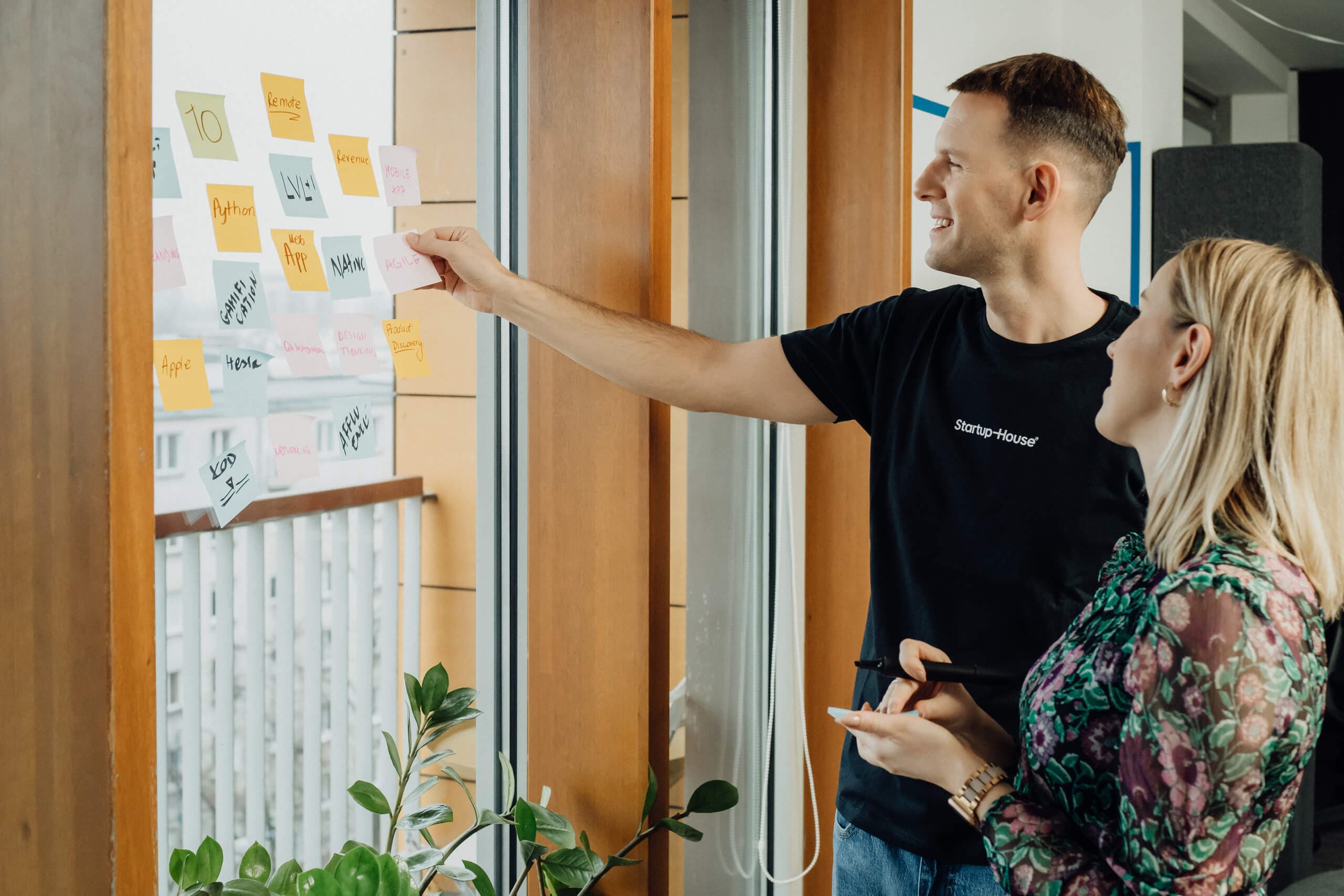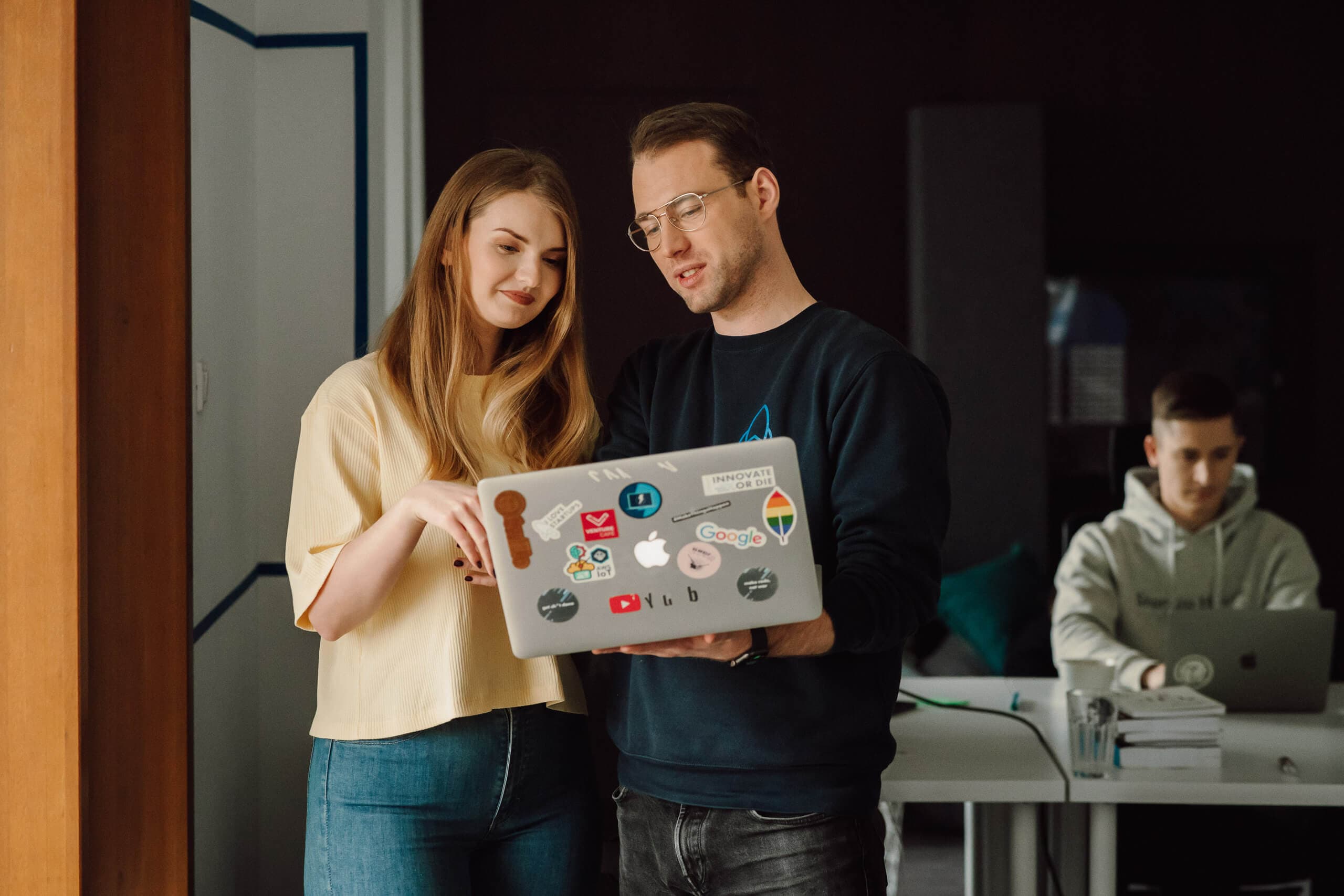How Accelerators Help Startups
Ewa Rutczyńska-Jamróz
Jun 02, 2023・11 min read
Table of Content
What are startup accelerators?
Why startup accelerators?
Do and learn
Validate the business idea
From basement to business world
Receive funding
How to choose the best startup accelerator?
Set your goals
Talk to accelerator graduates
Be clear about your value proposition
Accelerators worldwide - top programs
Top startup accelerators in the U.S.
Top startup accelerators in Norway
Conclusions
Airbnb, Dropbox, and AirHelp. It's quite likely you're familiar with these company names, given their prominence among the more successfully accelerated startups of the world. That is to say, startups whose growth gained momentum thanks to an ever-increasing rate of acceleration. A rate that continues to increase annually.
But what are startup accelerators? How do startup accelerator programs work? Which are the top startup accelerators?
What are startup accelerators?
The first thing to know about startup accelerators (or seed accelerators) is that they mostly support early-stage startups; in most cases, tech startups. Early-stage businesses apply for accelerator programs because of the numerous benefits these programs provide.
Startup accelerators support founders and their teams through education, networking, mentorship, and even seed funding-raising. The scope of this support differs depending on the particular accelerator program involved.
There are some common characteristics that make startup accelerators vary from other institutions that support early-stage businesses (e.g. incubators). They are:
fixed duration - startup accelerator programs usually take just a few months;
procedure - selective criteria are applied in cycles to choose startups for a given cohort;
mentorship - as the educational part can be more or less intense, there is always great emphasis on mentoring and networking;
demo day - startup accelerator programs are usually concluded with a demo day during which startups can pitch their business idea to potential investors or business partners.

Why startup accelerators?
As startup accelerators differ from one another, founders can look for benefits that suit their individual needs.
Do and learn
What one undoubtedly gains from an accelerator program is the opportunity to learn by practice. To gain skills and experience in the actual doing of a project. Thanks to educational blocks, startup networking, industry-expert mentoring, and the occasional chance to apply a business idea in practice, significant acceleration in a company's development results. Founders can learn more in just a few months than in what would normally take them years.
Validate the business idea
Taking part in an accelerator program is an excellent opportunity to test and refine the business concept. A startup accelerator program also helps to clarify and even reach key milestones in a business plan. This support may come through the fine-tuning of a business model, the gaining of customer traction, and/or by determining funding resource requirements.
And this certainly influences a startup's readiness to engage potential investors: a founder who graduates from an accelerator program will typically have the far more solid, mentor-consulted business model and pitch deck that is expected by angel investors or other funding institutions.
From basement to business world
A seed accelerator provides a unique opportunity for a startup to get out of the basement and present its idea to the business world. Being part of an extensive ecosystem means an accelerator can grant its members access to potential customers, end-users, business partners, and other such related connections.
Accelerators often partner with other organizations, including corporations and municipalities that are looking for innovative ideas to solve their problems. Good match-making thus results in the opportunity to test a business concept in a real business environment, or even in gaining its first paying customers.
Receive funding
But accelerator programs don't just open doors to potential investors. Some offer funding sources themselves. However, there is no common rule here, and financing details must be checked on a case-by-case basis.
Financing may come as a reward to those who've won over the audience on demo day. In such cases, a startup has the complete freedom to allocate money accordingly. This may be in the form of a minimum viable product, team recruitment, office space lending, etc.
There are also cases of a seed accelerator offering funding in exchange for an equity stake. Here, not only does such an exchange increase a startup's growth rate, but also establishes the accelerator as an investor.
Learn more about funding sources from our blog post -> How to get funding for a startup [link]
How to choose the best startup accelerator?
Set your goals
Being selective when choosing the right accelerator program is key. You must start by determining your needs and expectations.
Some accelerators focus long on education, which more often than not involves many hours spent in seminars. Therefore you must also determine:
- Are you ready to dedicate your time?
- Does the program suit your training needs?
- Who will lead the training sessions?
- If you're in need of mentorship, find out:
- Who are the mentors?
- From what industry do they come?
- What is their track record?
- When it's funding you seek, ensure that what you can secure is relevant to the time you invest and your equity stake.
Talk to accelerator graduates
If you've already determined what your requirements are, the next thing to do is to verify the accelerator experience. The best way to do this is to talk to any accelerator graduates who will share their insights. Doing so will educate you on how the experience influenced their startup's growth and gain you advice on how best to prepare for the selection process. It's likely that you'll also be advised on which mentors to prioritize.
Next is to check the accelerator's success rate. Analyze the number of exits and amounts raised. If you can't get hold of such data or the accelerator is not respected, think twice before applying. It could be a simple case of costs outweighing benefits (i.e. time, money, equity stake, etc.).
Be clear about your value proposition
Once you've found the most suitable accelerator program, you then need to figure out how to optimize your chances of being nominated for it. Since the nomination procedure is selective, it means that your application will be one among hundreds -- which therefore means that you must do your best to ensure it’s not lost in this crowd. Your application must distinguish itself enough to catch the attention of accelerator representatives.
In other words, as the accelerator program must suit you, so too must you suit the accelerator program. If and when this is established, ensure your application is as clear and concise as possible. Avoid using long descriptions and/or buzzwords. Focus on your business idea and explain how it is going to solve the problem at hand.
Always speak in terms of your venture's value. Remember also that startups with a minimum viable product or the final product can benefit more here. A mere business idea may not be enough to leverage the potential of making connections or talking to angel investors.
Accelerators worldwide - top programs
Numbers only confirm the popularity of startup accelerators: "There are over 3,000 accelerators worldwide and over 1,000 in the United States alone." (source: The Best Startup Accelerators — The Definitive List for 2021).
If you’re looking for your ideal accelerator, numerous rankings of the best accelerator programs are a good source of information. But before diving into such rankings, it's better you have a closer look at your methodology, which should begin by measuring an accelerator's success through its exit rate, i.e. how many accelerator graduates per exit (e.g. IPO, acquisition).
Below we present the most popular accelerators in the United States and Norway. Why those countries? Because the United States is the leading country in the number of startups worldwide - more than 71k (source Startup Statistics (2022): 35 Facts and Trends You Must Know). Norway, meanwhile, has recently become a leading hub for technology-based startups in Europe (source: 240 Best Startups in Norway).
Top startup accelerators in the U.S.
Y Combinator
located in Palo Alto;
offers a 3-month accelerator program for startups at different stages;
goals: better product with more users, access to funding sources;
investment: USD $500k in every startup on 2 separate safes (1) USD $125k on a post-money safe in return for 7% of the company; 2) USD $375k on an uncapped safe with a Most Favored Nation);
startups accelerated: more than 2,000;
funding: more than USD $52 billion;
examples of accelerator graduates: Airbnb, Dropbox, Coinbase;
application: in cohorts, apply here: https://www.ycombinator.com/apply
Learn more: https://www.ycombinator.com/
Techstars
operates worldwide with headquarters in Boulder, Colorado;
offers a 3-month accelerator program of three types: virtual, in-person, and hybrid;
goals: operates through different platforms to nurture innovation and provide investments, focuses on debt, early-stage ventures, and seed-stage companies;
investment: USD $100k convertible note, out of which TechStars contributes USD $20k in return for 6% of the company;
startups accelerated: more than 1,500;
funding: more than USD $12 billion;
examples of accelerator graduates: SendGrid, Digital Ocean, Bench;
application: in cohorts, 6 times a year, apply here: https://www.techstars.com/accelerators
Learn more: https://www.techstars.com/accelerators
500 Startups
located in San Fransisco;
offers a 4-month accelerator program for seed startups;
goals: focus on product strategy and investor pitches;
investment: USD $150 k in return for 6% of the company (charges USD $37.5k for participation, the fee can be deducted from the investment);
startups accelerated: more than 700;
funding: more than USD $4 billion;
examples of accelerator graduates: GitLab, Udemy, Canva;
application: on a rolling basis, apply here: https://500.co/accelerators/500-global-flagship-accelerator-program/apply
Learn more: https://500.co/accelerators/500-global-flagship-accelerator-program
The Alchemist Accelerator
located in San Fransisco;
offers a 6-month intensive online program;
goals: structured path to traction, customers, and fundraising;
investment: USD $36k as seed money mostly in the form of SAFE on graduation;
startups accelerated: more than 300;
funding: more than USD $1.2 billion;
examples of accelerator graduates: mPharma, Matternet, Mightyhive;
application: in cohorts, apply here: https://www.alchemistaccelerator.com/apply
Learn more: https://www.alchemistaccelerator.com/
Angel Pad
located in San Fransisco and New York;
offers a 3-month accelerator program for early-stage venture and seed companies, preferably in such industries as SaaS, marketplaces, data, advertising, API, mobile, healthcare, and AI;
special focus on women-founded startups;
goals: finding product-market fit, defining a target market, fundraising;
investment: USD $120k in a startup, companies also have access to more than USD $300k in cloud credits (AWS, Google, and Digital Ocean);
startups accelerated: more than 150;
funding: more than USD $2.2 billion;
examples of accelerator graduates: Buffer, Postmates, Astrid;
application: in cohorts, apply here: https://angelpad.com/#apply
Learn more: https://angelpad.com/
Top startup accelerators in Norway
Antler
operates globally, including Oslo, Norway;
offers a 6-month accelerator program for startups in the energy, property, and mobility sectors;
goals: match-making with potential co-founders, idea validation, fundraising;
investment: USD $110k in return for 11% of equity stake;
startups accelerated: more than 300 (globally);
examples of accelerator graduates: Rask, Scales, Glint Solar;
application: in cohorts, apply here: https://www.antler.co/platform/#apply-now
Learn more: https://www.antler.co/norway
MashUP
located in Oslo;
offers a 3-month accelerator program for startups with a business idea no older than 1 year and operating in the following areas: creative industries, communication, gaming, app development, web concepts, music, fashion, film, and design;
focus on a tailored mentor program and activities such as pitching contests and crowdfunding campaigns;
examples of accelerator graduates: Recho, Museai, Musebox;
apply here: http://mashupnorway.com/apply/
Learn more: http://mashupnorway.com/
Founder Institute
operates globally, including Norway;
designed for founders and teams throughout the pre-seed stage, including aspiring founders with full-time jobs, solo founders, teams, and founders of established companies that are pre-funding;
investment: no financial injection, each Founder Institute alum contributes 2.5% of startup equity in Warrants to a fifteen-year Equity Collective, and when a liquidity event occurs the pool’s financial returns are then distributed to local leaders (1%), mentors (0.5%), and Founder Institute HQ (1%);
startups accelerated: more than 5,000 (globally);
funding: more than USD $1.75 billion;
examples of accelerator graduates: TotalCtrl;
application: in cohorts, apply here: https://fi.co/join
Learn more: https://fi.co/
Katapult
located in Oslo;
offers a 3-month accelerator program for startups with a positive impact;
goals: providing training, technical expertise, and financing;
investment: USD $150 - $500k per startup in return for 8% of equity stake;
startups accelerated: more than 130 (globally);
examples of accelerator graduates: Chooose, Bio-Me, Brim Explorer;
application: in cohorts, apply here: https://katapult.vc/apply-to-the-katapult-accelerator-program-2022/
Learn more: https://katapult.vc/startups/accelerators/
Startup Lab
located in Oslo;
offers a 3-month accelerator program for Norwegian tech startups creating products or services for businesses (B2B) or consumers (B2C/D2C);
focus on access to a broad network of experienced founders, investors, and industry experts;
investment: NOK 1-3M per startup in return for 10% of equity stake;
startups accelerated: more than 100;
examples of accelerator graduates: CuttingRoom, Osirion, Sirken;
application: in cohorts, apply here: https://startuplab.no/apply/accelerator
Learn more: https://startuplab.no/accelerator
Conclusions
There is a multitude of benefits a startup accelerator can offer, the most substantial of which are:
validation of business models;
benchmark against other startups;
comprehensive support;
making connections;
access to potential investors;
regular check-ins in the venture development process;
financial injection.
So, when you're ready to accelerate your route to market, taking part in an accelerator program should be your first consideration.
But again, ensure you're selective when choosing. There are hundreds of accelerators worldwide, with each having different value propositions and commitment requirements for startup founders. It's your job to assess whether the accelerator offer is sufficiently suited to your product and business needs. Talk to other startups and accelerator graduates and establish whether a particular accelerator is worth the investment of your efforts.
Selecting the right one can mean a big step forward taken.
Startup House is an active member of the startup ecosystem in both the United States and Norway. If you are looking for the best accelerator for your startup, we're here and ready to share our insights and connections. Let's get in touch!
Digital Transformation Strategy for Siemens Finance
Cloud-based platform for Siemens Financial Services in Poland


You may also like...

The Power of Prototyping: How Startups Achieve Success on a Budget
Prototyping empowers startups to test ideas, save money, and increase their chances of market success.
Alexander Stasiak
Mar 14, 2025・8 min read

Unlocking Speed: How Agile Methodology Transforms Rapid Prototyping at Startup House
Agile methodology accelerates rapid prototyping at Startup House, helping ideas turn into products faster.
Alexander Stasiak
Apr 23, 2025・15 min read

Choosing the Right Software Development Partner: A Practical Guide for Startups
The right software development partner can define your startup’s success. This guide shows how to choose one that fits your goals and needs.
Alexander Stasiak
Dec 30, 2024・10 min read




